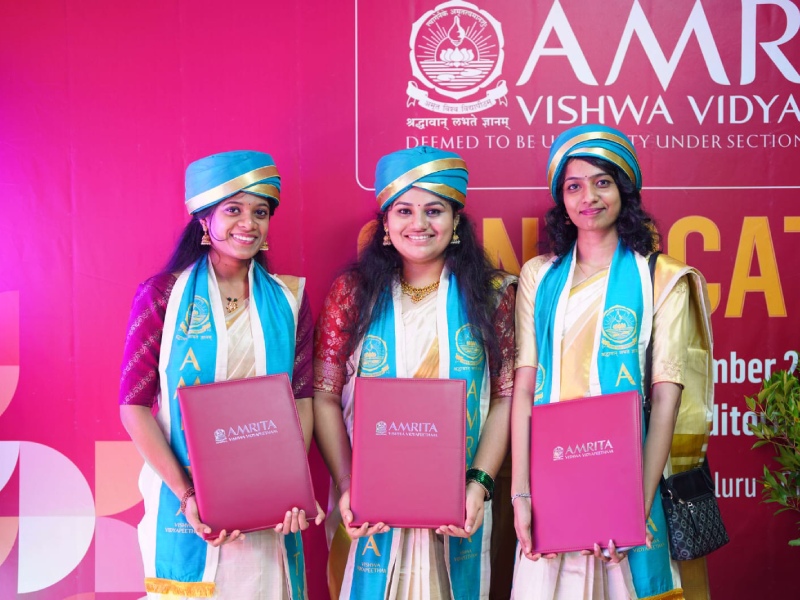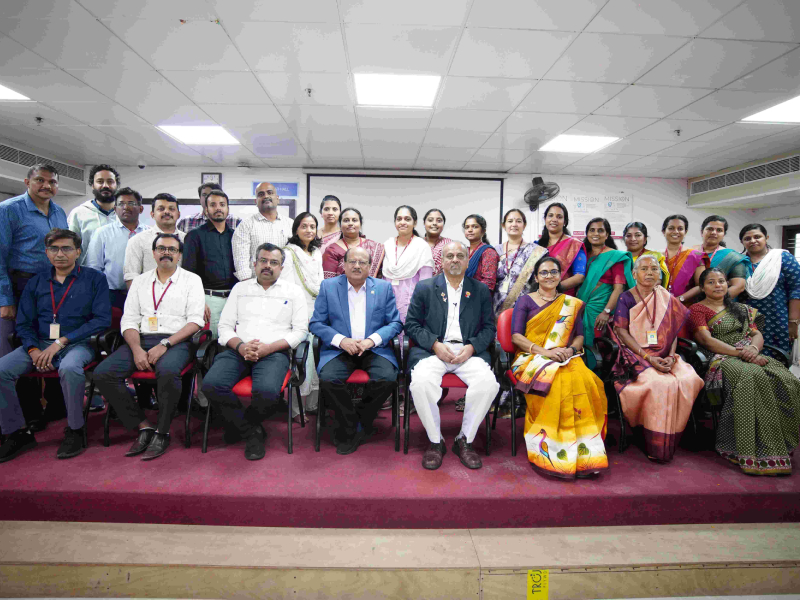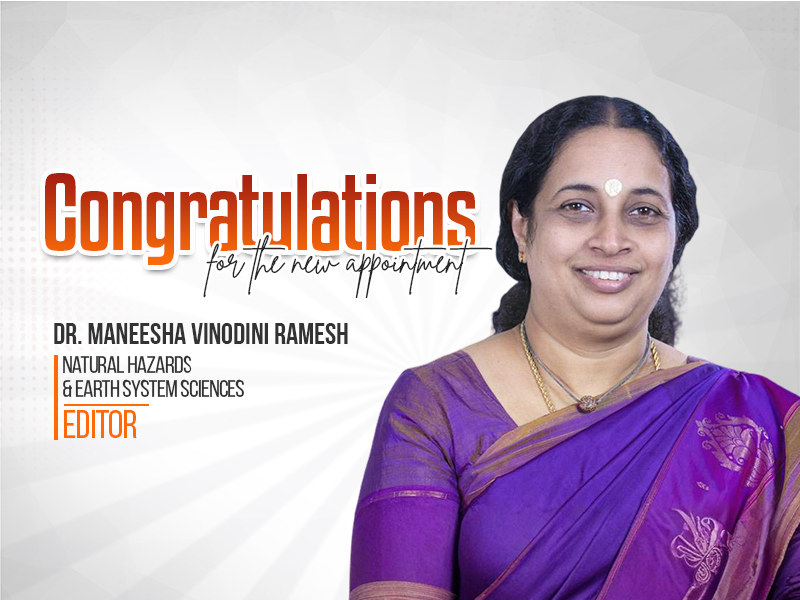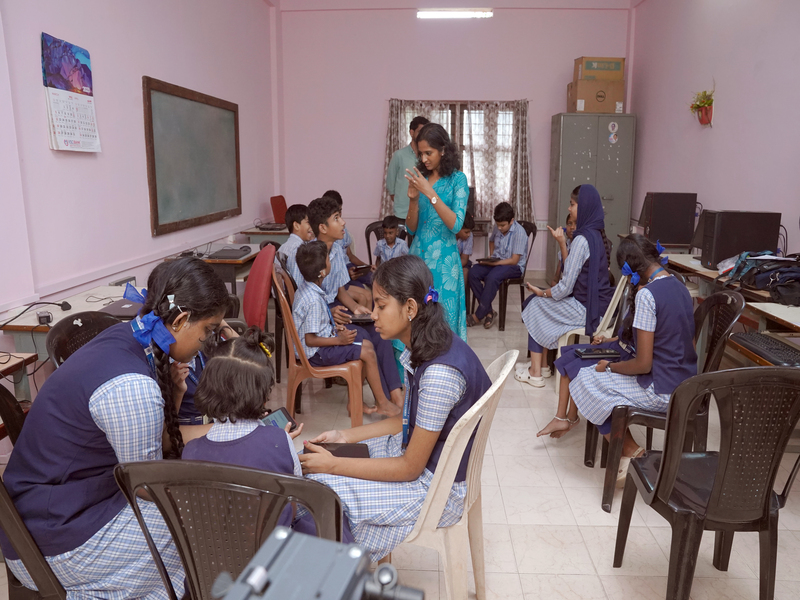March 4, 2011
School of Medicine, Kochi
 Dr. M. K. Bhan, Secretary to the Government of India and the Director-General of the Department of Biotechnology (DBT), recently visited Amrita’s Health Sciences Kochi, to participate in the DBT Nano-Bio Meeting 2011 organized at the Amrita Centre for Nanosciences and Molecular Medicine.
Dr. M. K. Bhan, Secretary to the Government of India and the Director-General of the Department of Biotechnology (DBT), recently visited Amrita’s Health Sciences Kochi, to participate in the DBT Nano-Bio Meeting 2011 organized at the Amrita Centre for Nanosciences and Molecular Medicine.
The meeting facilitated interactions among various nanotechnology and biotechnology experts from academia, industry particularly pharmaceutical companies and different research labs in India.
At the meeting, expert scientists and industrialists from all over the country led discussions on research in nano-drug delivery.
The Amrita Centre for Nanosciences recently received a substantial grant on Nanotoxicology and Nanomedicine from DBT and hence was selected to host this event.
 “We are extremely lucky to benefit from the presence of Dr. Bhan and the other very distinguished members of the DBT task force gathered here today,” said Dr. Venkat Rangan, the Vice Chancellor of Amrita Vishwa Vidyapeetham, as he welcomed the group of distinguished scientists.
“We are extremely lucky to benefit from the presence of Dr. Bhan and the other very distinguished members of the DBT task force gathered here today,” said Dr. Venkat Rangan, the Vice Chancellor of Amrita Vishwa Vidyapeetham, as he welcomed the group of distinguished scientists.
In addition to participating in scientific discussions, the Amrita medical fraternity was fortunate to have the opportunity to hear Dr. M. K. Bhan discuss research.
“We are very happy and delighted to have Dr. M. K. Bhan here with us to share his views on the importance of research in a medical setting,” stated Prof. Shantikumar Nair, Dean of Research at Amrita.
“It is always a bit of a challenge to figure out how to bring research into a medical institution,” he added.
Speaking on the relevance of research and the power of observation in a medical setting, Dr. Bhan shared his personal experiences with the audience. Included below are excerpts from his talk.
I think, as you go to medical school you always ask this question to yourself, “Is research relevant to me?”
I actually did my senior residency in a hospital that used to admit 60 children every night and I used to be exhausted by morning. I remember that for about three-and-half to four years I could never sleep. Those were the days when the whole of India was dehydrated. When my boss talked about some research project, I said there is no time for that.
 Then one day I started thinking. These diseases are to be prevented, rather than to be cured. And it is difficult to do that without applying a scientific method to understand the genesis of disease in the population.
Then one day I started thinking. These diseases are to be prevented, rather than to be cured. And it is difficult to do that without applying a scientific method to understand the genesis of disease in the population.
There are two reasons why I think research in a medical setting is important. One is to learn how to deliver health care better. There is something that is known as physician-inspired innovation where luck favors the prepared mind. Ideas emerge from observation. This kind of observation is possible in a setting where research-oriented minds are observing human disease either in a population or in a hospital.
There should be research in medical school as it prepares you to learn more. The second reason why medical research is important is that it appears that the future paradigm of medicine will change to some degree; how affordable it will be and how equitable it will be. I do not know but the fact remains that the organization of a medical school and a research institution has become crucial for this kind of research.
There are a couple of issues that we need to address to be successful. One issue is the opportunity to learn to do research. In my own life, I could not go away for two-three years to do a PhD. If I were to ask, what is the biggest challenge for the leadership of the medical schools? Make it possible for young people in these med schools to learn to research in an easy way. Now do not tell me there are problems, the question is, do you want it. The second issue is that of the career path.
 If the institution has access to a larger population, it helps the researcher to form millions of hypothesis and answer them. It is a challenge of the medical system and the scientific system.
If the institution has access to a larger population, it helps the researcher to form millions of hypothesis and answer them. It is a challenge of the medical system and the scientific system.
The scientific system should reach out and try to understand the peculiarities of the medical line and help with the learning opportunity. The medical system should help the scientific people learn more about the disease. There is the opportunity called unique hybrid education which can be part of the original training. Institutions which have basic research foundation can do amazing things.
I hope with these few words some of the younger people in this hall will start asking questions and thinking about, ‘how do I become a researcher?’
 Dr. M. K. Bhan, Secretary to the Government of India and the Director-General of the Department of Biotechnology (DBT), recently visited Amrita’s Health Sciences Kochi, to participate in the DBT Nano-Bio Meeting 2011 organized at the Amrita Centre for Nanosciences and Molecular Medicine.
Dr. M. K. Bhan, Secretary to the Government of India and the Director-General of the Department of Biotechnology (DBT), recently visited Amrita’s Health Sciences Kochi, to participate in the DBT Nano-Bio Meeting 2011 organized at the Amrita Centre for Nanosciences and Molecular Medicine. “We are extremely lucky to benefit from the presence of Dr. Bhan and the other very distinguished members of the DBT task force gathered here today,” said Dr. Venkat Rangan, the Vice Chancellor of Amrita Vishwa Vidyapeetham, as he welcomed the group of distinguished scientists.
“We are extremely lucky to benefit from the presence of Dr. Bhan and the other very distinguished members of the DBT task force gathered here today,” said Dr. Venkat Rangan, the Vice Chancellor of Amrita Vishwa Vidyapeetham, as he welcomed the group of distinguished scientists. Then one day I started thinking. These diseases are to be prevented, rather than to be cured. And it is difficult to do that without applying a scientific method to understand the genesis of disease in the population.
Then one day I started thinking. These diseases are to be prevented, rather than to be cured. And it is difficult to do that without applying a scientific method to understand the genesis of disease in the population. If the institution has access to a larger population, it helps the researcher to form millions of hypothesis and answer them. It is a challenge of the medical system and the scientific system.
If the institution has access to a larger population, it helps the researcher to form millions of hypothesis and answer them. It is a challenge of the medical system and the scientific system.





